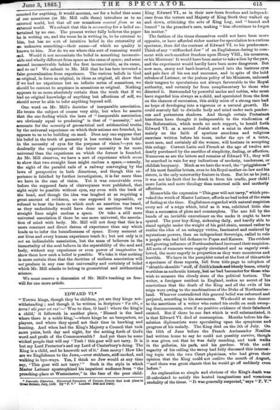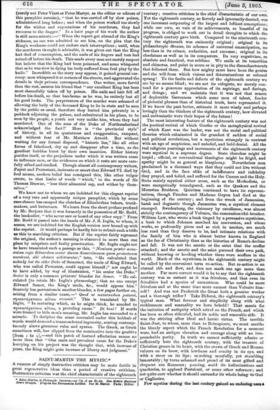EDWARD VI.*
" YOUNG kings, though they be children, yet are they kings not- withstanding ; and though it be written in Scripture ' Van tibi, o terra I ubi peer est rex'—' Woe to thee, 0 land ! where the king is a child,' it followeth in another place, ' Blessed is the land where there is a noble king,'—where kings be no banqueters, no players, and where they spend not their time in hawking and hunting. And when had the King's Majesty a Council that took more pains, both day and night, for the setting forth of God's word and profit of the Commonwealth? And yet there be some wicked people that will say Tuslx this gear will not tarry. It is but my Lord Protector's and my Lord of Canterbury's doing. The King is a child, and he knoweth not of it.' Jesu mercy ! How like are we Englishmen to the Jews,—ever stubborn, stiff-necked, and walking in bye-ways. Yea, I think no Jew would at any time say, ' This gear will not tarry." Such is the style in which Master Latimer apostrophized his impatient audience from " the preaching-place at Westminster," in the face of the poor child-
• Narratio Historic:a. Bistoricid Narration of Certain Brenta that took place in Great Britain, July, 5553. By " P. V." London: Bell and Cady.
King Edward VI., as in their new-born freedom and independ- ence from the terrors and Majesty of King Stork they walked up and down, criticizing the acts of King Log, and " huzzed and buzzed " in the preacher's ears, making " him oftentimes to forget his matter."
The fashion of the times themselves could not have been more opposite, or have afforded richer matter for speculation to a curious spectator, than did the contrast of Edward VI. to his predecessor. Think of any " stiffnecked Jew " of an Englishman daring to com- ment with such manifest freedom upon Henry VIII., his measures, or his Ministers! It would have been easier to take a lion by the paw, and the experiment would hardly have been more dangerous. But now men, saucy and hard-hearted, peered into the lustrous eyes and pale face of his son and successor, and in spite of the bold rebukes of Latimer, or the jealous policy of his Ministers, unloosed their tongues to speculations not always favourable to the Royal authority, and certainly far from complimentary 'to those who directed it. Surrounded by powerful uncles and nobles, who mast have regarded him always as a child, and speculated from the first on the chances of succession, this sickly scion of a strong race had no hope of developing into a vigorous or a natural growth. He could scarcely fail to dwindle body and mind under such ponder- ous and portentous shadows. And though certain Protestant historians have thought it indispensable to the vindication of the Reformation, which needs no such support, to herald forth Edward VI. as a second Josiah and a saint in short clothes, mainly on the faith of spurious anecdotes and religious exercises written before his teens, under the eye of a tutor, most men, and certainly all the women, will hesitate in accepting this eulogy. Correct Latin and French at the age of twelve are dearly purchased by the sacrifice of simplicity, feeling, or affection. Numerous as are the letters and remains of Edward VI., they will be searched in vain for any indications of modesty, tenderness, or childish buoyancy. Much as we hate the word, the "priggishness " of his most familiar letters, even to his Royal mother-in-law and his sisters, is the only noteworthy feature in them. But let us be just; it was not his fault that he drank in from his cradle, poor child more Latin and more theology than maternal milk and motherly affection.
Meanwhile the expression "This gear will not tarry," which pro- voked the wrath of Master Latimer, affords no bad index of the state of feeling at the time. Englishmen regarded with natural suspicion every act of a reign which, brief as it was, exhibited little else than a succession of plots and counterplots. The axe fell by the hands of an invisible executioner on the necks it ought to have spared. The poor boy-King, sickening daily, and hardly able to stand upright under the weight of his gold chain, seemed rather to realize the idea of an unhappy victim, fascinated and enslaved by mysterious powers, than an independent Sovereign, called to rule a people who had bid defiance to Popes and Kaisers. The evident and growing influence of Northumberland increased their suspicion.. All sorts of rumours were eagerly circulated and as eagerly swal- lowed, the more eagerly in proportion as they were monstrous and horrible. We have in the pamphlet noted at the foot of this article a specimen of these reports, full from title-page to colophon of " skimble-skamble " stuff, Of death's heads and bloody bones, utterly worthless as authentic history, but no bad barometer for those who wish to measure the cloudy state of the political horizon. The writer, a foreigner resident in England, makes no secret of his convictions that the death of the King and all the evils of his reign were owing to the machinations of the Duke of Northumber- land. Whoever contradicted this general belief was suborned and perjured, according to his statements. We should at once demur to the assertions of a writer who rested his credit on such sweep- ing denouncements, even if no positive evidence of their falsehood. existed. But if there be one fact which is well substantiated, it is that Edward VI. died of consumption. Months before his dis- solution diplomatists were speculating upon the symptoms and progress of his malady. The King died on the 5th of July. On the 16th of June before the French Ambassador Noailles had written home to say he could not possibly survive, though it was given out that he Was daily mending, and took walks in the galleries, his park, and his gardens. With the cold sagacity of his calling the envoy had fully discussed this interest- ing topic with the two Court physicians, who had given their opinion that the King could not outlive the month of August, "and there was great chance that he would go off suddenly even before."
Au explanation so simple and obvious of the King's death was ill-calculated to satisfy the heated imaginations and voracious credulity of the times. " It was generally suspected," says " P. V." (sorely not Peter Vilest or Peter Martyr, as the editor or editors of this pamphlet surmise), " that he was carried off by slow poison, administered long before; and when the poison worked too slowly for the wishes and expectations of his murderers, they had recourse to the dagger." In a later page of his work the author is still more minute :—" When the report got abroad of the King's sickness, no one was admitted to see him, on the plea that the King's weakness could not endure such interruptions ; until, when the murderers thought it advisable, it was given out that the King had died of consumption, and the nails of his fingers and toes had rotted off before his death. This made every man not merely suspect but believe that the King had been poisoned, and some whispered that as he was slow in dying his body suffered from foul play by the knife." Incredible as the story may appear, it gained general cur- rency; men whispered it at corners of the streets, and aggravated the details in their private correspondence. One writer, more fervid than the rest, assures his friend that " our excellent King has been most shamefully taken off by poison. His nails and hair fell off before his death, so that handsome as he was, he entirely lost all his good looks. The perpetrators of the murder were ashamed of allowing the body of the deceased King to lie in state and be seen by the public as usual, therefore they buried him privately in a paddock adjoining the palace, and substituted in his place, to be seen by the people, a youth not very unlike him, whom they had murdered. One of the sons of the Duke of Northumberland acknowledged the fact 1" Here is " the provincial style" of history, in all its quaintness and exaggeration, rampant, and without fear of Mr. Matthew Arnold. IAA without waiting for any formal disproof, " historic lies," like all other forms of falsehood, dry up and disappear after a time, as the gaudiest bubbles burst by their own inanition. Either history purifies itself, or the prejudices under which it was written cease to influence men, or the evidences on which it rests are more care- fully sifted and studied. Though almost all contemporary writers,. Papist and Protestant, insinuate or assert that Edward VI. died by foul means, modern belief has consigned this, like other vulgar errors; to that limbo of weeds "which," in the words of Sir Thomas Browne, "lose their alimental sap, and wither by them- selves."
We know nob to whom we are indebted for this elegant reprint of a very rare and apparently unique pamphlet, which by some rare chance has escaped the clutches of Elizabethan bakers, trunk- makers, and buttermen. We learn from the short preface prefixed by Mr. Berjeau that it was formerly in the possession of Mr. Rodd, the bookseller, " who never saw or heard of any other copy." From Mr. Rodd it passed into the hands of Mr. J. B. Inglis, to whom, it seems, we areindebted for the English version now bound up with the reprint. it would perhaps be hardly fair to submit such a trifle ao this'to searching. criticism. But if the reprint fairly represent the original, the author's meaning is.obscured• in more than one place by misprints and faulty punctuation. Mr. Inglis ought not to have translated such a passage as this, "Neminem prxter avun- culum regis Eduardum senior ducem Somersitensem quern protectorem vocabant, sibi obstare arbitrare-tur," into, " He calculated that nobody but the elder Duke of Somerset, the uncle of King Edward, who was called Protector, could oppose himself ;" nor ought he to have added, by way of illustration, " his senior the Duke." Senior is only a common printers' blunder for Senior. " He cal- culated [to retain Mr. Inglis's phraseology] that no one except Edward Senior, the King's uncle, &c., would oppose him." Scarcely leas portentous is another blunder, a few pages further on, arising from a similar cause,—" Quod ut maturandum putaret, ofox&rcipirszou cariou accessit." This is translated by Mr. Inglis, " In maturing which, as he might think, he acceded to ..rfoxarck.gnmou carrot', a preruling cause." Di boni ! If words were framed to hide men's meaning, Mr. Inglis has succeeded to a miracle. To decipher the sense concealed under this hubbub of words would demand a transcendental ingenuity, soaring contemp- tuously above grammar rules and syntax. The Greek, as Greek sometimes will, has slipped from the nominative into the genitive (from v to o) —and this patch of learned affectation means no more than that " One main and prevalent cause for the Duke's hurrying on his project was the thought that, with increase of years, the King might gain increase of liberty and judgment."































 Previous page
Previous page